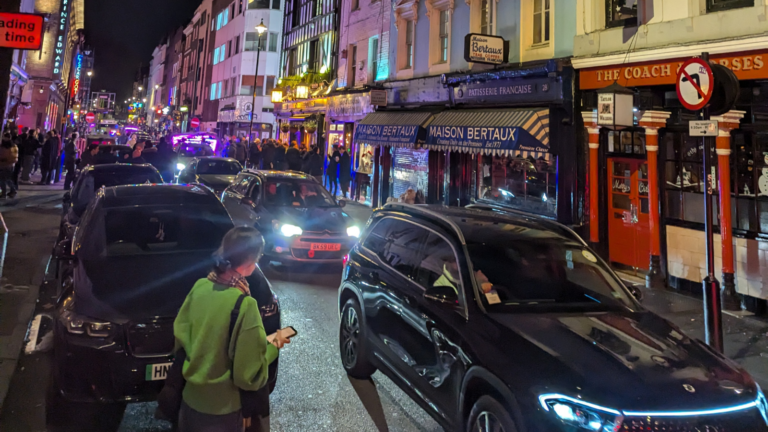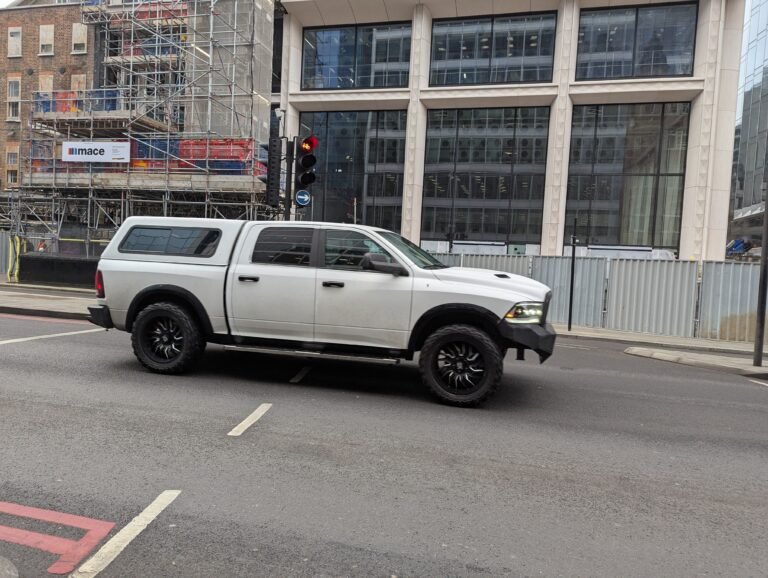
1 million cars sold every year too big to park; as car owners back higher SUV charges to fix potholes
Around 4.6 million cars have been sold in the UK that are bigger than a typical urban car parking space since 2021 – more than 1.2 million a year.
- The parking overhang of these supersized SUVs would stretch 192 miles from London to Leeds, campaigners call for fairer taxes and parking charges
- Car owners want additional charges on SUVs spent on fixing potholes; Only 19% don’t want to see additional charges on SUVs
- Proposals included in new academic study which finds that heavier cars are more likely to be involved in fatal collisions
- A two-tonne SUV does 16 times more damage than a one-tonne car
Around 4.6 million cars have been sold in the UK that are bigger than a typical urban car parking space since 2021 – more than 1.2 million a year, with numbers growing, according to researchers at Clean Cities, a European network of organisations calling for healthy and climate-friendly transport in cities.
Supersized SUVs, which are either more than 1.8m wide or 4.8m long, have been growing in popularity despite them crowding out space in towns and cities, causing more road wear and being more likely to cause fatal injuries for children, cyclists and those driving smaller cars.
If you were to add up just the extra length and width that overhanging SUVs take up, it would stretch for over 192 miles, the equivalent of driving from London to Leeds.
“Cars are getting bigger every year – while our streets are not. We need carmakers to prioritise normal sized cars that can be parked more easily and are less dangerous to people walking around. It’s only fair if you want to buy a massive SUV that you should expect to pay more for the space it takes up.”
Oliver Lord, UK Head of Clean Cities
To tackle the phenomenon known as ‘carspreading’, campaigners are calling for fairer taxes in favour of lighter and more appropriately sized cars and for parking costs in cities to be based on the size of a car.
When asked how the money raised from additional charges on SUVs be spent, the most popular measures amongst car owners were to fix the millions of potholes (54%) on Britain’s roads, which increase danger and repair costs for motorists and cyclists; followed by safer roads (40%) and better public transport (36%). Only 19% said there should be no additional measures for SUVs, according to a You Gov poll commissioned by Clean Cities.
“It’s not just the added stress of not being able to find somewhere to park, it’s the sense that if I’m involved in a collision with one of these giant SUVs, that me and my family are far more likely to be seriously hurt or killed.
“If you cause more danger, create more potholes and take up more parking space, it’s only fair that you pay a little bit more.”
Harriet Edwards, a concerned parent from Sutton
A new UK academic paper published this week shows that heavier cars are more likely to be involved in fatal collisions and average car weight in the UK is increasing.
This may lead to a rise in fatal collisions if the trend continues, the academics warn. Reducing car weight could mitigate the severity and frequency of collisions, while the academics suggest that policy makers could consider “taxation on heavier cars” and that “local authorities could adjust parking policies to charge higher fees for heavier cars”. The study, led by civil engineer Ruth Carlson with a co-author from the University of Huddersfield, is based on preliminary findings with the full paper out later this year.
New taxes could reap significant rewards for HM Treasury and the Department of Transport. As well as the additional revenue, discouraging sales of heavier cars could reduce road maintenance costs.
According to ‘the fourth power law’’, a formula developed by US Highway Officials, the damage done by a vehicle to a road surface is proportional to the fourth power of its axle weight.
A two-tonne SUV therefore does 16 times more damage than a one-tonne car. The potholing of road surfaces is even worse when it rains because heavier vehicles create much stronger hydraulic pressure, forcing water into any flaws and breaking up the road surface.
Figures from the RAC show drivers encounter an average of six potholes per mile in England and Wales and the cost of pothole damage to vehicles is around £500 on average, with more severe repairs costing considerably more. According to the AA, fixing potholes is a priority for 96% of drivers.
“Better maintenance of the road network is the number one concern of drivers as damage costs a fortune and potholes can be fatal for those on two wheels.”
Edmund King, AA President
According to the YouGov polling, 61% of UK passenger car owners agree that “SUVs take up too much space”, while only 19% disagree. 71% of car owners also agree that SUVs make parking more difficult, while only 15% disagree.
Notes to Editors:
- More info: alex@alexbigham.com; Alex Bigham +44 (0)7830 195 812
Interviews: Oliver Lord, Clean Cities oliver.lord@cleancitiescampaign.org +44 (0)7779 811 380 - Hi-Res Photos: SUV Alliance – Google Drive and
SUVs and families (Credit Crispin Hughes) – Google Drive and https://climatevisuals.org/search/?searchQuery=crispin+ hughes - Data: YouGov SUV Survey results tables: You Gov Polling on SUVs and Carspreading 2025.xlsx – Google Sheets
- Carspreading: Clean Cities Campaign
Guidelines state that on-street parking bays should have a minimum width of 1.8m, and length of 4.8m which is the typical size in urban areas Source: Understanding Car Park Markings
Analysis of UK new car registrations Dataforce data by T&E, the parent organisation of Clean Cities. Overhang – 251km + 59km = 310km, equivalent to 192 miles. London – Leeds distance around 197 miles.
| 2021 | 2022 | 2023 | 2024 | TOTALS |
Sales of vehicles longer than 4.8m | 100,752 | 98,222 | 108,289 | 109,279 | 416,542 |
Average overhang beyond 4.8m long (m) | 0.14 | 0.14 | 0.14 | 0.15 |
|
Total distance covered by the length overhang (km) | 14.25 | 13.62 | 15.29 | 15.94 | 59 |
Sales of vehicles wider than 1.8m (excluding wing mirrors) | 914,405 | 934,475 | 1,124,213 | 1,213,385 | 4,186,478 |
Average overhang beyond 1.8m wide (m) | 0.06 | 0.06 | 0.06 | 0.06 |
|
Total distance covered by the width overhang (km) | 53 | 56 | 68 | 74 | 251 |
“SUVs are more likely to cause fatal injuries for children, cyclists and those driving smaller cars”. A French academic study from 2023 examined collision data from 300,000 accidents. Let’s take the example of a collision between a 1600 kg car and a lighter 1300 kg car. The risk of fatal injury: reduces by 50% for the occupants of the heaviest car; increases by almost 80% for the occupants of the lighter car. In the event of an increase in mass of 300 kg, the risk of fatal injuries is also 30% higher for vulnerable road users. VIAS | Heavier, taller and more powerful cars for two-speed road safety?
YouGov SUV Survey results (22-23 January 2025, sample size 2,133 adults weighted of which 1,404 were passenger car owners). You Gov Polling on SUVs and Carspreading 2025.xlsx – Google Sheets
How should the money raised from any additional charges on SUVs be spent? (Please select all that apply. If you do not think there should be any additional charges on SUVs, please select the ‘Not applicable’ option) | Passenger Car Owners |
Fixing potholes | 54% |
Safer roads | 40% |
Better public transport | 36% |
More parking spaces | 18% |
Subsidies for electric vehicles | 17% |
More green spaces | 16% |
Adult social care | 12% |
Better housing | 10% |
New schools | 8% |
Don’t know | 6% |
Other | 3% |
Not applicable – I don’t think there should be any additional charges on SUVs | 19%
|
Thinking about SUVs (Sports Utility Vehicles, e.g. Nissan Qashqai, BMW iX, Land Rover Defender etc.)…To what extent do you agree or disagree with the following statements? SUVs take up too much space | Passenger car owners |
Strongly agree | 28% |
Tend to agree | 33% |
Neither agree nor disagree | 18% |
Tend to disagree | 13% |
Strongly disagree | 6% |
Don’t know | 2% |
According to Dataforce, in 2023, 60% of all new cars bought in the UK were SUVs. If this trend continues, SUV registrations could make up 75% of new cars by 2027.Thinking about the growing trend for SUVs…To what extent do you agree or disagree with the following statements? More SUVs will make parking more difficult | Passenger car owners |
Strongly agree | 33% |
Tend to agree | 38% |
Neither agree nor disagree | 11% |
Tend to disagree | 10% |
Strongly disagree | 4% |
Don’t know | 3% |
This survey was collected on the YouGov Panels, where each member has accepted to participate in online interviews and has received an E-mail invitation with a link to the survey. The sample definition is created in order to provide a representative cross-section of the UK population, based on the target group and the purpose of the survey. The figures have been weighted and are representative of all UK adults aged 18+. Data was weighted according to the dimensions of gender, age and geography on the basis of an ideal weighting from Statistics UK, so that the results are representative of the population in relation to the aforementioned target group.
Road Damage Calculator: The road damage calculator is an easy-to-use implementation of the Fourth Power Rule, a formula developed in the late 1950s by the American Association of State Highway Officials. It was intended to help traffic engineers understand the impact of vehicles on wear and tear of the road surface.
According to ‘the fourth power law’road damage calculator’, a formula developed by US Highway Officials, the damage done by a vehicle to a road surface is proportional to the fourth power of its axle weight. A two-tonne SUV therefore does 16 times more damage than a one-tonne car.
See Opinion: Cars have a weight problem, and it’s damaging more than the environment | Hagerty UK and https://roaddamagecalculator.
UK Academic Paper : “An investigation into the relationship between car weight and fatal collision rates in the UK”
Research supported by the Future Visions Transport Group www.ftvg.co.uk
AA quote and figures on potholes: Seven million more potholes to be filled next year as public urged to report roads in need of repair – GOV.UK
About Clean Cities
We are Europe’s largest network of organisations on a mission to build public support for cities to shift from polluting cars to active, shared and electric mobility. Clean Cities is hosted by T&E.





